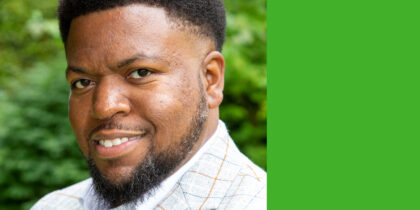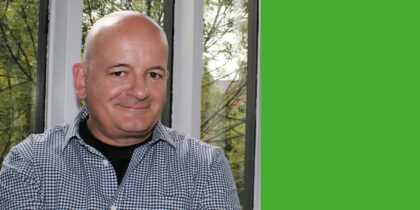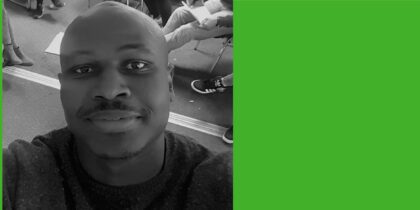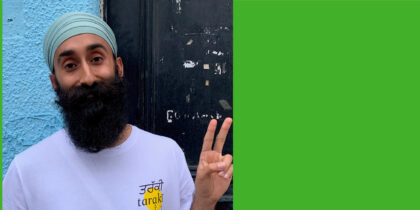Thea is joined by Steve Gilbert OBE to hear about his work driving change in mental health from an anti-racist perspective. They discuss Steve’s contribution to the Independent Mental Health Act Review, and how this was informed by his experiences of mental illness and of racism. Steve also talks about how the pandemic and the wave of Black Lives Matter protests in 2020 have changed our understanding of racial inequality in mental health.
Listen to the episode on Spotify or Apple Podcasts. The full transcript is available below.
Show notes
- Visit Steve’s website to find out more about his work
- Read our report on the Shifting the Dial programme supporting young Black men’s mental health in Birmingham
- Take a look at our report Breaking the circles of fear which explores the experiences of Black African and Caribbean communities within mental health services
- If you enjoyed this episode, please consider donating to enable us to produce more content like this.
Music by scottholmesmusic.com
Transcript
Alethea Joshi (AJ): Hello and welcome to Centre for Mental Health’s podcast, where we explore ideas around mental health, equality, and social justice. I’m Thea Joshi, and on the podcast we chat to people who are working for equality in mental health. This month I had the chance to speak to Steve Gilbert OBE. He was Vice Chair for the Independent Mental Health Act Review, and led the work around improving outcomes for Black African and Caribbean communities. Steve shared a bit about his own experience with bipolar disorder and experiencing the Mental Health Act first hand. And we also discussed the weathering effect of racism on mental health, working from an anti-racist perspective, and the way the pandemic has shaped our understanding of racial inequalities. So we dived straight in with this one discussing Steve’s many roles…. Hope you enjoy.
AJ: How do you like to refer to yourself?
Steve Gilbert (SG): The honest answer is, I’m not sure. That question of, you know, what is your role? How do you like to be described, defined doesn’t get any easier if I’m being honest. If we go prior June 2020, I was using the title of serious mental illness living experience consultant. A bit of a mouthful. But there was a logic behind that. The logic was that a diagnosis of bipolar disorder is categorised as a serious mental illness. That’s not to say that other diagnoses aren’t severe or serious in how they affect people. But there’s always an inherent dangerousness and kind of seriousness to a diagnosis like bipolar disorder, both in terms of the highs and the lows. I think a title party is what you own as a person. I never liked the term expert by experience. You know, expert by experience of what? Eating Doritos? Haribo? What are we talking about here? And especially when sat in a room with people that, you know, have got quite imposing titles, you know, they’re a lecturer of something or they’re a consultant or something. And the kind of the reason for kind of being quite specific, around, you know, the serious kind of element of illness is that, you know, it’s great that the area of mental health has got much more people contributing to it.
But it’s such a wide field. But you know, at this end we’re talking about prioritising and promoting good mental wellbeing and good mental health. Then we’re talking about, you know, a person missing a day’s work here or there. Then we’re talking about, you know, someone that needs to go on, for example, antidepressants or perhaps needs to join a peer support group. Those are all their own distinct things, but they’re very, very different to living with something like bipolar disorder, which requires daily management, and even when you do that and you do everything right, it is a case of when will I be ill again and how quickly can we catch it? So that’s kind of where that title came and that fitted. And then I’d kind of use that from 2016, really through to the early part of 2020. And then I was doing more on my own sort of kind of set up, like consultancy, which was starting to kind of find its feet.
And I guess my work has always had a race element to it, not just by virtue of the fact that I’m biracial, but actually the work I’ve been involved in. So the first piece of work I was involved in was a piece of work called 300 Voices. And this is back in 2014. And this was, you know, specifically about the experiences of young, black African Caribbean man, trying to understand what their experience of mental health care is and why they’ve always come in through a criminal justice route, as opposed to a purely health, and all of the things associated with that. So race had always been there. But I come at work much more from a kind of a mental health space. And just for multiple reasons, and being, you know, self employed, it’s quite difficult to exist in a health based space. I kind of go back to the idea of the titles. There isn’t really a framework for people who are trying to work independently. But even when you look at some of the national organisations, the way in which they want to engage with people with lived experience when not just lived experience of mental illness, you know, a really strong skill set is really limiting. It’s not just limiting in terms of your ability to affect change, it’s limiting how much they’re willing to pay you and that in and of itself is a whole other issue.
AJ: Yeah. A lot of conversations going on at the moment around that and how we genuinely have a high regard for lived experience and recognise it as a critical voice around the table I guess and how that is reflected in renumeration, and things like that. So we were talking earlier on about the work you’ve been doing over the last few years, what with COVID and the pandemic and within anti racism so, could you tell us a little bit more about that?
SG: Those of us that know how health inequality really presents, knew instantly that like COVID was here and we could have a really good guess at who it was going to affect disproportionately. We knew, we’ve been here before, we’ve looked at the data, we know. So those of us who work in and around kind of health inequality more widely, certainly where race and ethnicity are concerned, we weren’t surprised by the fact that, you know, there was a disproportionate number of deaths that were occurring from people who were Black, South Asian, and to use a phrase which some people don’t like but it’s quite helpful in this respect, non-white.
What was interesting was the news at the time, and this was, you know, mainstream media, they were the ones reporting on this. Now, again, anyone that’s been around health inequalities long enough knows that we have a really hard time trying to get on a mainstream agenda. Prior to COVID, even when mental health and kind of health inequalities more generally were talked about, they were always talked about in a really specific frame. And part of that frame was around not just race and ethnicity, but it was around issues of income. So are we talking about low income or poverty? Are we talking about educational standards? Are we talking about illicit drug use? Are we talking about there being an association to kind of criminal behaviour? That was the framing. COVID kind of changed all of that in a way, because what you had were people from across the hospital workforce, including people at consultant level, you know, top earners, highly educated, but they were Black, or they were Asian, and they were dying of COVID. So the arguments around income level, poverty, education, illicit drug use, all those things, they were no longer valid.
And there was more of a question going, well hold on a minute, this is happening to these people at a disproportionate rate, but it’s not happening to their white colleagues at the same rate. So what’s going on there? Is COVID affecting people differently based on genetics? And again, we didn’t know, we didn’t have any information on this at the time. Or is it something more systematic around the experiences of Black, South-East Asian, in particular, immigrant populations working in the NHS?
And then, of course, George Floyd died. And I think that affected people on multiple levels. There was something very distressing and very visual around what we saw. But no one was surprised. It was just, oh, you caught this on camera. And we know that, be it you’re in the United States, in the UK, or across the world, people lose their lives because they are different. And it happens all the time.
What we wanted to do is we really wanted to make sure that this wasn’t just viewed as an issue that was in the US. So I did a bit of digging and I looked and was really searching to find where have Black Lives Matter protests taken place. And they were global. And when you start to look around the world, you start to see that this inequality was being represented in different ways. So part of what the globe was experiencing as a whole was this trauma of seeing this man killed. But also, a lot of it wasn’t to do with George Floyd in particular, a lot of it was to do with, you’re now listening, and you need to listen to our experiences. Or, you need to listen to the fact that this isn’t a one off. This is not just some tragedy that, you know, happened out of nowhere. This is happening across the world. And worse than that, it is systematic.
So there’s all these different levels to it. And as someone that describes himself as biracial, the world sees me as Black, very funny stories around people not believing I’ve got a white mother. And, again, you know, difference between the US and the UK, cops off guns over there. Over here, we’ve got tasers. If you look at the statistics and the data around the use of tasers and deaths, they’re disproportionate around Black populations. When you start to look at what’s going on in the mental health system, again, the data is shocking. And I think we’ve become desensitised. And one of the things we can become desensitised to is around death rates, for example. That can be death rates in custody, police custody, that can be death rates in hospitals, that can be death rates in prisons, that can be death rates due to maternal care. Whatever it is, that should never be the measure of how well a system is doing. Because for every death, well, how many near misses.
But more so than that, and this is why the Mental Health Act and the systematic discrimination that takes place there, what is equally as upsetting as people losing their life is you look at the especially as you go through the severity of what degree of being in a secure unit, then you start to look at who’s physically on those wards, some of those wards are pretty much exclusively Black people. And we are talking years of life. Effectively imprisoned. And as you go up that security level, some have committed horrendous crimes. I’m not disputing that. You can get into questions around what failings happened that could have averted that.
As we start to come down, and you start to look at those that have not committed any crime and you start to think about years of life, in a hospital, taken away from everything you know, and the long-term impact of that, it absolutely happens to people that are white, it happens to people of all ethnicities, but it’s happening at a greater rate for people who are Black, Black Caribbean in particular. That just beyond impossible to sit there and comprehend. So the death of George Floyd hit all of us in different ways. But for me, in particular, I think the term anti racism, which is not a new term, that even though I’d worked in the space for many years, it was a term that I hadn’t been using, wasn’t part of our vocabulary. But actually, it just made sense, because I had been sat there for this point, you know, seven odd years, constantly saying to people, this is wrong, it’s not just wrong because I’m saying it’s wrong, the data tells us. And I’m not going to sit here and you know, enter into a conversation where we’re saying, Black people are more prone to be mentally ill, because of something genetic. I’m not gonna sit here and say, you know, there’s more criminality in Black communities. I’m not gonna sit here and say that they want less out of life. Absolute rubbish. And for me, that term anti racism, it just gave me something I hadn’t had before, which was, no, it is not right that you will sit there, any of us sit there and go, I’m not part of this equation because I’m not racist. Well, okay. But what are you doing to actually change things? Bearing in mind this is all the same question you asked at the beginning around the title, that’s when I started to use the term anti racism consultant. Now, I don’t know. Because none of those two terms really seemed to work over the course of say a month, certain times I’m sat in a room and yeah, I do feel like I’m really there thinking about the intersection between my illness and my skills and my understanding of how our mental system works. Other times, I’m absolutely there talking about anti racism, guiding organisations through how they tackle this. Other days it’s a combination of all of these things.
AJ: I just wonder if you could you tell us a little bit, you’ve touched already about your own experience of bipolar, but I wonder if you’d be happy to tell us a little bit more about your own story? And perhaps, how you feel that maybe racism impacted your mental health?
SG: I think the question around what role does racism play, what role does racism play in my life and my experience of mental illness, it’s a question that depending on who’s asking, depends on whether we were asked to want to answer it or not. And I’m completely happy to answer here because I know where you’re coming from with it. Part of the challenge of that is, and again who’s asking the question is always really important, it can end up with almost: prove to me that racism played a role in your life. To be clear, I know that’s not what you’re asking. But that’s what it can end up being like.
And, you know, think about all the ‘isms’. It’s not just about race, if we think about sex, gender, age, all of these different parts of our, our identities. Sometimes, you’re in a conversation and it’s like: prove to me that it was race. And you kind of go: no, because the premise of the question is corrupt. Racism is a thing. And you either believe that or you don’t. I’m not going to sit here and try to convince anybody that race has a role. We all have to come to that conclusion on our own. What was quite interesting, again going back to June 2020, and all these companies are coming out with anti racism statements. And one really stuck in my head, and it was Warburtons. And Warburtons basically put up this tweet that said, we haven’t put out an anti racism statement, because we’re trying to figure out what that means for us as a company. I don’t really expect a bread making company to have a really great handle on anti racism. I just don’t, they make bread.
But that’s very different to organisations that work, specifically in the mental health space, who’ve almost kind of come up with the same argument. And it’s like, no, you guys know. You guys know because I’ve sat around the table with you. And I’ve told you, and your team member executives, specifically what’s going on? And you’ve looked at the data, you’re playing naive, and that’s not fair. So that question around what role does race play (and I’m kind of answering a slightly different question to the one you posed) but almost the tricky side, if you like, of the death of George Floyd, and what that means for our healthcare systems, is that it almost gave a pass to people that didn’t deserve one. Because they’re able to go, oh, well, now we get it. Are you kidding me? This is nothing new and you know.
And when you start to think about that on a personal level, it’s really, really difficult because you then almost start to question yourself. Did racism play a role? I know it kind of did, it’s kind of there, it’s very ethereal. But actually did it play a role? Can I come up with an example where someone was like, we’re doing this to you because you’re Black? Well, I’ve got a few examples like that. But actually, that denies the fact that the majority of racism, the way it presents in the UK is not overt. It’s no longer socially acceptable to do some of the things that were done to me as a child. When I was a kid, you know I’m 38 now. I would say, I grew up at the back end of traditional racism, when it was still socially acceptable to call somebody a black – you know, insert the adjective – and it wasn’t very nice. But you can kind of deal with it.
And actually, you know, I almost find it easier to talk to someone who’s a racist now. They’ll walk up and they’ll say, I don’t think you should live here, I think you should go back to where you came from because you’re not English. And you kind of go, that’s a really messed up thing to say to somebody. But you know what, that’s almost easier for me to engage with because you’re being honest, and you’re being honest with yourself. Part of the problem in this country is all these well meaning good people that are like, Well, I’m not racist, and it’s like, no, but you are, because you don’t understand how racism presents and racism is not calling somebody a bad word. Racism is not having, you know, separate toilets for people based on their skin colour. That would be incredibly wrong. But actually, it is built in to our policies. It’s built into our customs. And by customs I mean, how we treat people, both the people that we work alongside, the people we engage with in our day to day life, and the people who we are serving, as part of our job, be that we work in Tesco, or we’re a psychiatrist working in a hospital. And it’s very, very difficult to explain to somebody the impact of microaggressions. It’s very difficult to explain to somebody, ever since I was a teenager, people crossed the street when they saw me coming. I’m not a particularly big guy. But I walk in a certain way, I push my shoulders out, and partly because I don’t want to get mugged myself. You know, when you walk into a shop, and, you know, I’ve literally been asked to leave certain shops because I couldn’t afford to shop in there.
I actually stood in a shop once, no one came near me. They all looked at me. And then after about five, six minutes, I was like right I’ll go look at the shirts. This woman and her daughter walked in and staff were there within 20 seconds. Now people go oh, but but but, and I’m going to have to explain to you that that is not an everyday occurrence, you don’t get it. And it’s not that you don’t get it, it’s that you are actively trying to not see it. But what you’re saying is, I don’t believe you.
Now you can either go, well, that’s a really silly example, that’s you in a shop buying a shirt. Guess what? That happens every single day in all of our systems, that happens in the criminal justice system, that happens in our healthcare system, happens in education, you know, why is it that we’ve got six year old boys who are experiencing and displaying the same behavioural issues as their white counterparts, one goes down the pastoral route, one goes down the disciplinary route. They’re six years old, there is no such thing as a bad six year old, yet they are being treated as if they are. So that question of what’s the role of racism in an individual’s health care problem is, it’s really quite challenging. And then you start to think, actually, our experience of healthcare, as a society looking to healthcare, we’re trying to screen healthcare as being an individual journey. We are changing on that with, you know, the view of kind of the lifecycle, and I think maternal healthcare is quite, you know, we know that we’ve got to protect the health care of the mother during pregnancy and afterwards because we know that has an impact. We know that. But it’s wider than that.
Half my family are Black. On the Black side of the family, there’s a lot of mental illness, a lot of severe mental illness. And then you kind of go how does that work in other families? And again, are there families that are white where there’s severe mental illness – absolutely. But it’s happening at a higher degree in some communities. So you start to go, well, is it genetic? Or is it something around how they’re experiencing the world? That has to play a huge role in that. And when we start to think about the way in which, you know, speaking quite broadly, what happens when you experience overt, covert, personal, systematic, institutional racism, however it’s impacting you, what it starts to do is it starts to change you. It starts to mean that you are not free to be yourself.
And I haven’t seen the evidence yet on actually not just what does that do in terms of so we know about the weathering effects and we know that actually, there’s this dynamic where a boy starts to enter his teens, starts to develop more as a man physically, and there’s a point at which the world stops seeing that person as a boy and starts seeing that person as a man. We know that happens earlier for Black boys and girls. We’ve got some really horrific experiences like child Q. We know that, we know there’s the adultification of Black children. What we’re not thinking about there is the weathering effect is not just that person gets on the bus and there’s a reaction, however subtle, of the bus driver or in the shop or wherever it is. It’s that that then causes a change in how that person interacts in the world. And that’s happening. And then that means at some point, that person is going to get pulled over by the police and everyone goes, Oh, well, you know, just comply. Well, that might statistically be the first time I’ve been pulled over. But it’s not the first time I’ve experienced something like that. So actually, this idea of, you know, just comply when actually that person has been experiencing the world as a Black person who doesn’t fit in or who isn’t English or British. Let’s call that what it is. That’s what we’re saying. Whatever level that’s impacting them. But what happens on a family level, when you’ve got gender thrown into that, misogyny? What then happens there?
So there’s all these different effects that are going on, which we don’t really understand that warrant research. And so actually, it’s not just an individual experience. This is too big of a jump to go from the individual to this, this phantom community. We know there’s a family there, whatever that looks like, we know there is you know, direct siblings, parents, aunts, uncles, there is a unit there. But actually what does that work look like that says, How was racism impacting, interacting with that group of people there? That would be a phenomenal piece of work. And I think it would throw up some real answers.
AJ: Thank you, Steve, for drawing all of that out because there are so many facets to that. And it’s definitely something that we’re doing a lot of work on, both in terms of our research, but also our own anti racism approach and within our organisation, and I mean, there’s so much there, but just, you know, when you were talking about the weathering effect, I instantly thought of our recent work with the Shifting the Dial programme with young Black men in Birmingham. And, and that weathering, eroding effect over time in this way that you can’t necessarily, as you say, it’s not necessarily like tangible, ah this thing really damaged by mental health. It’s a slow gradual wearing down of someone’s own self esteem and confidence and belief that they can do certain things and achieve certain things from, you know, a multi systemic approach in terms of kind of education, criminal justice, healthcare, we’re seeing that. And it’s really interesting what you said about often racism in this country now not being tangible. And obviously, we’re very glad things aren’t overt. But at the same time, as you say, it means that it’s less easy to identify one thing in particular, it’s more about, as you say, that kind of gradual weathering and that institutionalisation of racism, that stops people from actually just having the same opportunities for good mental health. So I mean, on that, that kind of leads us on to talking I guess, about the Mental Health Act review, which you’ve already mentioned. So obviously, you were the Vice Chair for the independent review that was led by Simon Wessely. And the review was published in 2018. And thankfully, the draft bill has now been published. So it’s making its way slowly through the legislative pipeline. But I guess I’d love to know a bit more about I guess why you wanted to get involved in that work and why you believe that the reform of the act was so necessary?
SG: Yeah, it’s a good question. I was detained in 2010, a relatively short period of time, I was in 21 days, and my friend basically got me out as quickly as she could so she could look after me under the care of a community mental health team. Multiple family members have been detained under the Act for large periods of time on multiple occasions. And so that’s all part of that familial impact. My dad was sectioned when I was three. You start to think what was it as a three year old that I can’t remember, but it’s definitely impacted me. What’s that collective experience as a family? So it was, you know, it was a real no brainer to be part of it.
And I think, you know, in terms of reform, again, when we kind of pan out from just thinking about race. We have this huge, huge increase in the number of people that we’ve detained over a 10 year period of time. Back in 2019, roughly 80,000 people being detained. And that’s a lot of people. And it’s really expensive. Surely there is a way to do something different. I think reform rather than Abolishment is always the most pragmatic. And I know that there are people that strongly disagree with me on that. And, you know, I can see where they’re coming from. I disagree, I think even if we have the best mental health care, social care, criminal justice, everything in the world, you are always going to have even if it’s 10% of people that are being detained who would need that provision. And as Sir Simon reminds us all the time, if you go to a country that either doesn’t have a Mental Health Act, or has one that has serious flaws in it, you do not want to be mentally ill in that country. I think the opportunity to be part of a change process like that was I think it was a watershed moment for those experiences.
And it’s interesting, we were talking about that earlier. And you know, part of part of my role was to support the review as a whole. Secondly, to coordinate the work around Black African Caribbean communities in particular. Of equal value was a group of people with lived experience. And we had a phenomenal group of 12 individuals who all wanted reform of the Act, or had very different experiences, some people were from a purely kind of career perspective, some people have been detained, and some people had both experiences. And that was, you know, this really rich, diverse range of experiences. And the knowledge that was in that group, the understanding that was in that group was phenomenal. So I’m glad that I was able to meet that that group, in particular. Everyone that was involved to whatever degree put everything in and I will defend that til the day I die, you know, we could not physically have done more. I just really hope that, you know, our collective effort is realised because it wasn’t a perfect process. But things have to be dramatically different. And this moves us in the right direction. It really does. The things that are in that draft bill, if we can get them into law, it will save lives. There’s no doubt about it.
AJ: Oh, thank you so much Steve for talking us through that. It’s really helpful to both understand a bit more about the process. But also just to kind of understand where we are now. And obviously, we at the Centre are watching its progress through the various parliamentary systems. And we’ll be keeping a really close eye on that. But I mean, I guess, yeah, just thank you for everything you did on it as well because I mean, we just had to have that both that lived experience perspective, but also your own unique perspective, I know has added so much depth. Yeah, it was a necessity. Before we wrap up, I just wanted to ask you, I do try and ask guests, how they manage their own mental health. Are there certain things that you do to try to kind of keep an equilibrium and to stay well? A big question I know.
SG: No, it’s a good question. It’s one that it depends on the day of the week, some days it’s a lot easier. There’s, always a foundation. I’m on three different medications so I take one in the morning and two of them at night. So again, making sure I have those, making sure I eat fairly sensibly, drink lots of water, don’t drink too much caffeine, try to be a little bit active. On those days, it’s still difficult because of the side effects of the medication, the biggest one being fatigue. So that’s always a real challenge. So the main thing that I need to manage is my energy levels. That is more difficult and not even when I’m like massively unwell. Like, last week, I was doing some stuff in the garden and I basically pushed by myself too hard. And then it’s just like a week of recovery at least and it’s really frustrating because I enjoy being active. When you feel like you’ve got some energy, it’s kind of really difficult to go you gotta hold some of it back. Because I don’t want to you know, and I was always active as a kid and there’s so much I had to let go.
I see people not even running marathons but going hill walking and stuff like that. I really struggle, like I can walk on the flat. But whatever’s going on inside whether it’s the illness itself, or it’s a side effect to the medication, there’s just this like, almost, like, drop off, that’s so severe. So I’d argue that actually one of the main things I have to manage is my expectations, which is really tricky, when you’ve already kind of given up on so much, you know. But it’s good, you know, I’m very blessed. And things can be incredibly difficult. But I’ve got amazing people around me and, you know, I count the Centre, and you know, the people that work there, kind of in that extended network of, you know, this is cathartic to be able to talk about, but it’s also, you know, I’ve got people to reach out to, and I know, there are people that don’t have that. And I guess that’s one of the big things that drives me is I know what it was like back when I didn’t know where to go for help. And unfortunately, that’s still the case today. So, you know, however difficult things get for me, I know that, you know, that’s not me denying the reality that I live with. There are people in the roads nearby where I live and where to, North parts of Scotland and down to Cornwall across the world that really need us to demand better. And I guess that’s what what drives so many of us. But yeah, thank you for asking.
AJ: Oh, Steve, thank you so much for being honest about that. But also just for giving up your time today. It’s been it’s been fantastic to chat to you. Yeah. Thanks so much.
SG: You’re welcome.
AJ: We really hope you enjoyed the episode. To join the fight for equality in mental health, please support our work at www.centreformentalhealth.org.uk/donate. See you next time.

















